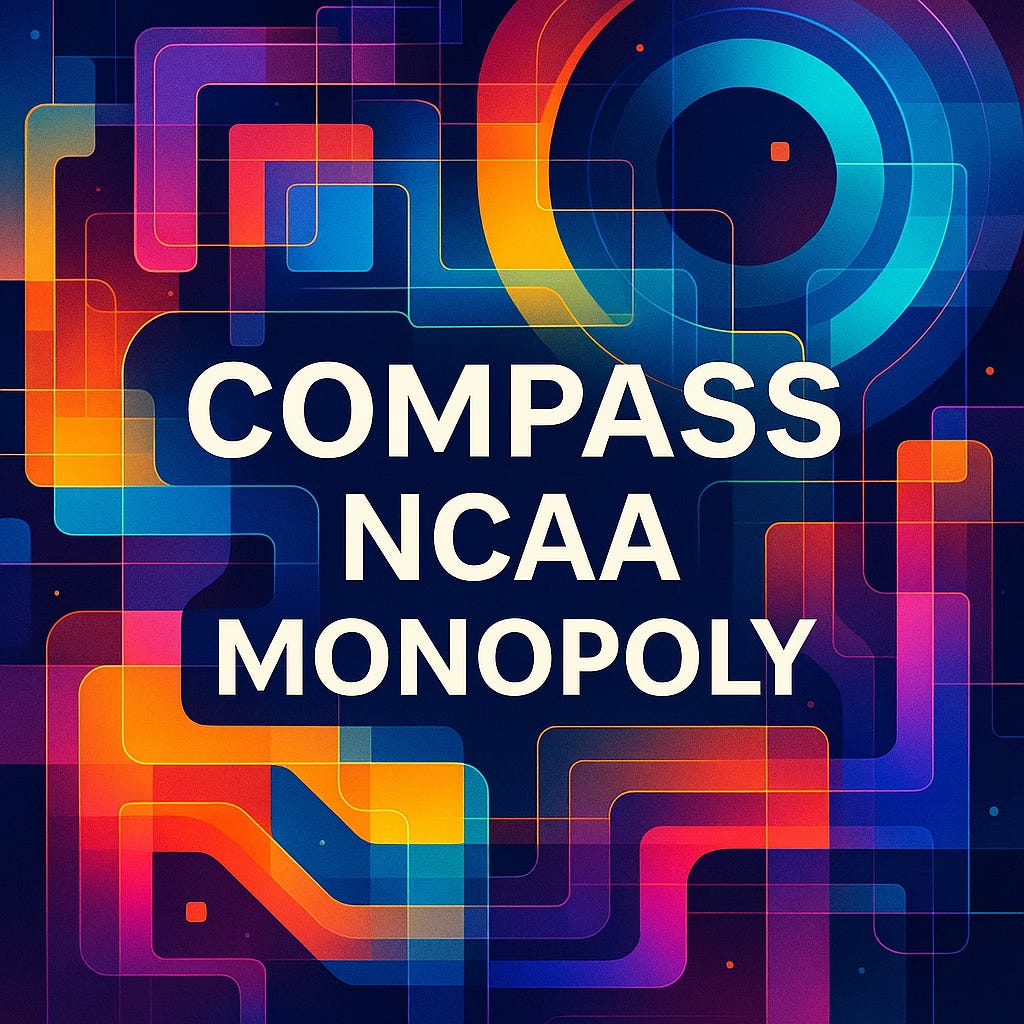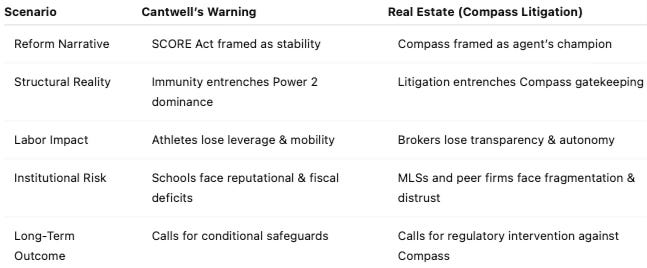MCAI AI Lex Vision: Compass' NCAA Analogy Is Backwards
A Foresight Reply to Robert Reffkin’s Op-Ed
I. Introduction: The Rhetoric of Reform, the Reality of Control
Compass CEO Robert Reffkin’s recent op-ed compares the plight of real estate agents to that of college athletes under the NCAA: exploited by monopolistic institutions, stripped of rights, and denied fair compensation. It is a compelling story, one that echoes Washington Senator Cantwell’s recent warning about the SCORE Act: that broad immunity can entrench inequality rather than reform it.
But the analogy collapses under scrutiny. In fact, it reverses the roles. In college sports, the NCAA entrenched exclusivity, denied mobility, and profited from labor asymmetry. In real estate, Compass plays that very role. Far from liberating agents, Compass is scripting its own form of NCAA-style control: restricting listing access, weaponizing antitrust language, and eroding transparency.
MindCast AI’s foresight work on both Compass litigation and federal interventions like the SCORE Act highlights a consistent pattern: those who claim to be reformers often write themselves into the role of monopolists.
Contact mcai@mindcast-ai.com to partner with us on antitrust law and economics.
II. Reffkin’s NCAA Analogy, Examined
Reffkin’s comparison deserves closer attention because it frames Compass as a defender of agents’ rights while portraying others as monopolistic gatekeepers. The NCAA analogy is meant to resonate with the public, leveraging recent headlines about athlete rights and reform. Yet when examined against the real structure of real estate markets, the analogy unravels and reveals more about Compass’s strategy than about industry norms.
Reffkin argues:
MLSs, Zillow, and NAR are like the NCAA—exploiting those who create the value.
Agents are like athletes—doing the work but stripped of ownership and leverage.
Compass is like NIL reform—fighting for fairness and transparency.
On the surface, the comparison is rhetorically powerful. But it ignores two decisive differences:
Agents are already paid. College athletes under NCAA amateurism rules were uncompensated for labor that generated billions. Real estate agents, by contrast, already receive commissions. The question is not whether they are paid, but how the rules of transparency shape competition.
Compass is not a reformer. Unlike advocates who fought to expand athlete rights, Compass restricts access. Its Private Exclusives model withholds listings from the public, creates silos, and deepens dependence on Compass insiders.
In short, Reffkin’s analogy works only if one confuses the labor dynamics. Independent contractor brokers are closer to athletes—dependent on open access to compete. Compass is closer to the NCAA—seeking to codify gatekeeping power under the guise of fairness.
III. The Compass Playbook: Litigation as Antitrust Theater
Compass’s strategy becomes clearest when viewed through the lawsuits it has filed in 2025. Rather than isolated disputes, these cases form a deliberate campaign to destabilize industry standards while recasting Compass as the reformer. The company’s actions are less about securing relief in court than about reshaping perception, weakening collective governance, and positioning itself as the arbiter of access.
MindCast AI foresight simulations of Compass’s lawsuits against NWMLS and Zillow reveal a consistent pattern:
Narrative Inversion: Compass accuses others of exclusion while hoarding inventory behind closed walls.
Co-Conspirator Strategy: It names peer firms like Redfin, eXp, and Windermere as “co-conspirators,” broadening reputational damage while shielding itself from counterclaims.
Platform Jujitsu: It feeds off open systems (MLS data, Zillow traffic) while exempting itself from reciprocal obligations.
Antitrust Theater: It litigates not to resolve disputes, but to destabilize shared governance and rewrite the rules in its favor.
This is not the behavior of a reformer. It is the behavior of a monopolist-in-waiting. The lawsuits are stagecraft—designed to frame Compass as a victim while repositioning it as the arbiter of access.
IV. The Real Victims: Brokers, Not Brokerages
MindCast AI’s June 2025 analysis, The Real Victims of Compass’s Antitrust Gambit, identified the overlooked group: independent contractor brokers. These agents depend on MLS transparency to serve clients and sustain income. Compass’s strategy of listing suppression, selective visibility, and reputational intimidation cuts directly against their livelihoods.
Key findings:
Brokers locked out of “Private Exclusives” lose 15–35% of potential income annually.
In high-cost markets, this translates to losses exceeding $50,000 per contractor per year.
By normalizing silos, Compass reduces broker mobility and deepens dependence—mirroring the NCAA’s control over athletes pre-NIL.
Just as the NCAA’s amateurism rules entrenched labor precarity, Compass’s gatekeeping threatens to create a new subclass of contractors whose survival depends not on skill or client service, but on loyalty to a dominant platform.
V. Foresight Simulation: The Future of Compass’s Strategy
MindCast AI’s CDT-based foresight modeling tested Compass’s litigation narrative against industry, legal, and regulatory responses. The outcomes align with Senator Cantwell’s critique of the SCORE Act: immunity and rhetoric can mask deeper structural imbalance.
The foresight conclusion is blunt: Compass is not dismantling monopolies. It is seeking to become one.
VI. Regulatory Implications: Seeing Through the Theater
Courts and regulators face a choice. If they accept Compass’s NCAA analogy at face value, they risk dismantling MLS and platform standards that actually preserve consumer access and contractor fairness. To prevent this inversion:
Anchor Antitrust in Consumer & Labor Harm. Courts must distinguish between competitor grievances and genuine harm to consumers and contractors.
Scrutinize Co-Conspirator Claims. Reputational smears without collusive evidence should not expand discovery or dilute shared governance.
Reinforce Transparency Standards. MLSs and platforms should double down on rules that guarantee open access—codifying them as pro-competitive safeguards.
Expose Narrative Inversion. Regulators must call out when firms weaponize fairness rhetoric to entrench exclusivity.
Antitrust is not theater. It is an instrument for protecting the public interest. Compass’s lawsuits are an attempt to turn it into a stage.
VII. Conclusion: Who Plays the NCAA Role?
Reffkin’s op-ed is built on a powerful story. But foresight simulation shows the story is backwards. Agents are not the NCAA’s “athletes.” They are today’s independent contractors—vulnerable, under-protected, and reliant on open systems. The NCAA role belongs to Compass itself: the gatekeeper seeking to codify exclusivity through law and litigation.
MindCast AI foresight simulations make the pattern clear:
Cantwell warns that the SCORE Act codifies imbalance in college sports.
Compass’s litigation codifies imbalance in real estate.
In both cases, the victims are those who do the work—the athletes and the brokers.
Antitrust must not be inverted into a tool of monopolization. Courts, regulators, and the public must see Compass’s lawsuits not as reform, but as performance.
Compass is not freeing the market. It is scripting its capture.




